- Home
- Sara Craven
Desperate Measures Page 8
Desperate Measures Read online
Page 8
Waiting in a cotton wrap, while her skirt was attended to, she fumed inwardly at her own gaucherie. She’d behaved like an idiot, as Alain would undoubtedly tell her later. All she’d needed to do was smile coolly in acknowledgement of the other woman’s presence, then ignore her.
At the same time she acquitted their hosts, Monsieur and Madame le Grès, of engineering another confrontation between Marie-Laure and herself. They were kindly souls, friends of Alain’s late parents, as well as business colleagues, and heavily involved in charity work. They probably didn’t even know that there was any involvement between Alain and Marie-Laure. And, of course, the Baronne’s father was quite within his rights to ask his daughter to accompany him to a formal dinner if his wife was ill.
No, it was just one of those unfortunate coincidences, and now her stupidly over-the-top reaction to Marie-Laure’s presence could easily have set all the tongues wagging again, she thought miserably.
Her skirt was eventually returned to her, miraculously restored, if a little damp in places, and she was able to join the rest of the party as they went into the dining-room. She was immediately besieged by concern and goodwill.
Her husband had explained the terrible incident that had befallen her earlier that day. To be robbed in the open street—quelle horreur! Such lawlessness! It was no wonder that she was affreusement nerveuse. But how was it that she should be in the street alone?
‘I was just leaving my painting class,’ Philippa explained lamely. ‘I work at a studio every day. I wasn’t expecting anything to happen.’
‘Ah, yes, your little career as an artist.’ Marie-Laure leaned forward, her expression solicitous. ‘It still continues? You have not yet wearied of it?’
‘I’m not likely to do that,’ Philippa said crisply. ‘It’s too important to me.’
Marie-Laure shrugged creamy shoulders. ‘You mean there is some lack in your life, for which you seek compensation?’ Her brows rose in simulated amazement. ‘How can it be possible? I hope that our dear Alain is not failing in his duties as a husband.’
There was a sudden shocked silence, and a number of eyebrows were raised in earnest. Madame le Grès hurried to fill the breach with a description of the plans the local community were formulating to celebrate Bastille Day, and conversation became general again.
Philippa sat back in her chair, her heart thumping. Alain was at the opposite end of the dining-table, and she did not dare look at him. What on earth was the Baronne trying to do? she asked herself in bewilderment. Her remarks had been indiscreet to say the least. It was almost as if she was deliberately trying to make trouble, stir up more gossip. Yet, surely, it was in her interests too that there shouldn’t be any more scandal. So what was going on?
She had to force herself to eat her dinner and chat brightly to her neighbours, behaving as if everything was perfectly normal. With any luck, Marie-Laure’s comments would be simply written off as a sample of female spite, and not attended to too closely, she told herself without particular conviction.
Afterwards, in the salon, coffee was served, and music was played, as a background to conversation. Philippa made sure she was always one of a group well away from Marie-Laure’s vicinity.
Although I’m being perfectly ridiculous, she told herself. By avoiding her like this, I’m putting myself on the defensive, and giving her an advantage. I should let her see that I’m indifferent to her—and impervious to her little poisoned darts. The trouble is, I keep remembering that woman’s remark that I’m ‘no match for Marie-Laure’ and believing it.
It seemed a very long evening, and she was too on edge to really enjoy talking to the people around her, although they couldn’t have been kinder. But they still wanted to hear about the attempted robbery, and she would have preferred to forget about it. She felt suddenly oppressed by the noise of laughter and chatter, and stifled by the cigarette smoke mingled with expensive perfume which filled the room.
She needed to be on her own for a few moments, preferably in fresh air. The doors on to the terrace had been closed during dinner, but one of them was slightly ajar, and Philippa slipped unobtrusively through it into the darkness beyond.
She stood perfectly still for a moment, drawing deep, grateful breaths of the cool, flower-scented air into her lungs. She realised almost at once that she wasn’t alone. From the other end of the terrace she glimpsed movement in the shadows and heard the mutter of lowered voices.
With a faint grimace, she half turned to go back indoors.
‘Alain.’ The name came to her on a throaty, seductive whisper, impossible to ignore or forget. Philippa’s head came round sharply, and she peered through the gloom to the far corner of the terrace where a trellis network interwoven with climbing plants provided a screen. Then, almost as if it had been summoned, the moon emerged from behind a cloud and she saw them, standing locked together, Marie-Laure’s arms round his neck, her body straining passionately against his.
‘Alain, mon amour.’
She didn’t want to see any more—hear any more. Only a few hours earlier that might have been herself, she thought, pain slashing at her, as she turned, fumbling her way blindly back into the salon. At least she’d been spared that, if nothing else.
Perhaps it wasn’t just a coincidence that Marie-Laure was here tonight. Perhaps she and Alain had planned it that way, so that they could meet, snatch a few illicit moments together. They’d been clever about it. She hadn’t noticed either of them leave the room, and nor, she could swear, had anyone else. It was a pleasant evening, and a good party. They were all too involved, too interested in their own conversations, which was what the lovers had probably relied on.
And this time, contrary to popular belief, the wife had been the first—indeed, the only one, to find out.
Not that it was strictly true, because she’d always known. That was why Alain had married her, for God’s sake. She was—camouflage. Only—seeing them together had made it all too real somehow. Had fixed her with an image of desire, of passion and sheer sensual urgency that she would never be able to forget.
A maid approached, offering more coffee, and she took a cup, swallowing a mouthful of the powerful black brew, feeling it scald against her aching throat.
‘Philippa.’ She jumped as Alain appeared suddenly at her side, his hand closing on her arm.
His face was grim as he looked down at her. ‘It was you—just now on the terrace?’ As she nodded mutely, he said harshly, half under his breath, ‘I thought so.’ He glanced round him. ‘We need to talk, you and I. I’ll find Madame le Grès and tell her that we’re leaving.’
‘No, thank you.’ She freed herself, gently and with dignity. ‘I don’t want to leave yet. I—I’m enjoying myself,’ she added defiantly. ‘And I have no intention of spilling another drink, or making a fool of myself in any way, so please don’t worry about me.’
‘Do you think I care about that?’ he said harshly. ‘I have to talk to you in private—to explain.’
‘You explained when we met.’ Philippa stared down at her coffee cup as if it was the most amazing and imaginative artefact known to the world of man. ‘It’s all right, Alain. You’re paying me very generously to provide a cover-up, and turn a blind eye to your—diversions. That’s what I’ll go on doing.’ She swallowed past the lump in her throat. ‘But I will not—not provide one of those diversions myself. In future I’d like my bedroom door to be provided with a lock and a key.’
The silence between them tingled in her brain, beat on her eardrums.
Eventually Alain said coolly and courteously, ‘D’accord, madame. It shall be exactly as you wish.’
‘And there’s one more thing.’ She continued to look down at her coffee. ‘I don’t think anyone here noticed you were missing—but it isn’t very wise to take chances like this, particularly when Madame de Somerville-Resnais focused attention on us all once this evening already.’
‘I am grateful for your advice, madame.’ His tone was frozen
silk. ‘But, under the circumstances, Madame de Somerville-Resnais, and my relationship with her, need no longer be any concern of yours.’
‘I understand,’ Philippa said, and turned away.
But it wasn’t true. The realisation that she didn’t understand—didn’t accept—struck her with all the force of a thunderbolt. Brought her to a standstill, coffee-cup in hand.
In fact, she understood only that she wanted to burst into tears, to scream and stamp her feet, and howl her misery to the four winds. She wanted to hurl the remains of her coffee over Alain’s immaculate dress shirt, and scratch her nails down his face until she drew blood.
And then she wanted to find Marie-Laure and … She drew a shuddering breath. It was better to stop right there.
The power, the enormity of everything she was feeling almost overwhelmed her. As did the implications of it all.
Jealousy, she thought. That’s what I’m feeling. I’m jealous. But I can’t be, because that would mean that I wanted Alain for myself. Maybe, even, that I’d fallen in love with him. And that’s impossible. It can’t be true.
Because if it is true, what can I do? How can I bear it?
She squared her shoulders. She thought forcefully, I won’t let it be true.
‘Pardon, madame?’ The look of smiling incomprehension from someone standing near her told her that she had inadvertently made that last avowal aloud.
Like an automaton, Philippa laughed, apologised, let herself be drawn into the conversation, absorbed into the group.
And all the time, pounding in her head like a steam hammer, came the silent despairing plea, Dear God, don’t let it be true. Don’t let me love Alain. Please don’t let me love him.
She could only hope, forlornly, that her prayer would be answered.
‘What the hell’s the matter with you today?’ Zak demanded in exasperation. He pointed at Philippa’s drawing board. ‘The assignment was meant to be a simple one. I wanted you to draw the lady on the dais—just a representation of the nude human form. Since when have you decided to go in for Cubism?’
Philippa flushed. ‘I haven’t. It’s just—well, life-drawing has never been my strong point.’
‘You can say that again!’ Zak stared at her drawing and groaned. ‘According to this, Jeannine looks as if she has about ten major bone deformities. It’s probably actionable.’ He turned to the model who was stretching cramped muscles and reaching for her wrap. ‘You don’t want to see this, chérie. It will only upset you.’
Jeannine smiled placidly, and went away to change with a wave of her hand.
Zak gave Philippa a measuring look. ‘So what’s the problem? Yesterday’s wallet hijack? They say lightning never strikes twice in the same place.’
Philippa smiled stiltedly. ‘I hope not. No, I just have things on my mind.’
‘Gavin, I suppose. Honey, what can I say? You’ve just got to trust the doctors. You won’t improve his condition in New York by fretting over it in Paris.’
‘I know.’ Philippa was guiltily, miserably aware that she hadn’t given her father a thought in twenty-four hours. ‘I’m sorry, Zak. Today’s been rather a waste of time, hasn’t it?’
‘You’ve had better.’ Zak took the drawing board and put it down somewhere else. ‘Go home, Philippa. Try and relax. Get that good-looking husband of yours to take you out to dinner.’ He leered at her. ‘Just for starters, that is.’
Philippa flushed. ‘He’s probably—busy.’
‘Then tell him to relax as well,’ Zak said largely. ‘I want you here tomorrow ready to do some real work.’
Easier said than done, Philippa thought gloomily as she walked downstairs. The previous evening she had driven home with Alain in a frozen silence. He had wished her a curt goodnight and gone to his room, leaving her to tell herself over and over again that was exactly—precisely what she’d wanted.
She went on saying it at intervals during a long and restless night. At some time before dawn, she had conceded defeat, got up, and crept barefoot to Alain’s room. It was empty, the bed unruffled and unslept in. She’d stared at it for a long time, then returned soundlessly to her own room, and wept.
The locksmith had arrived to attend to her bedroom door almost before she had finished breakfast that morning. Madame Giscard had worn an expression of outrage as she supervised his endeavours. Philippa was not sure she blamed her.
The housekeeper had also informed her glacially that Marcel would be available to drive her to and from her art class. The orders were from Monsieur Alain.
She came out into the street and looked for the car, but it wasn’t waiting for her. Small wonder, she thought, glancing at her watch. She was a good hour earlier than usual.
‘Madame de Courcy.’ She turned, alarmed, in time to see Fabrice de Thiéry loping towards her across the road.
‘I hope you didn’t think I was another thief.’ His smile warmed her. ‘I wanted to see you to return these.’ He produced her key ring from his pocket and held it out to her. ‘I must have picked it up by mistake yesterday.’
‘Oh, thank you. What a relief! I hadn’t dared confess I’d lost them.’
‘Your husband is such a monster?’ He sounded amused, but his eyes were serious.
‘No—no, on the contrary,’ Philippa said hastily. There was a pause.
Then, ‘You are early today,’ he remarked. ‘I was lucky to catch you.’
‘Not really.’ Philippa sighed. ‘I have to wait in future to be driven home.’
‘Well, that is the sensible course.’
‘Yes, but it isn’t what I wanted.’
He looked at his watch. ‘You have time, perhaps, for another coffee?’
Philippa hesitated. The sensible course in this instance would be to decline gracefully, and she knew it.
‘You’re going to refuse, aren’t you?’ Fabrice de Thiéry said ruefully. ‘Well, I don’t blame you. Your husband is a formidable man, after all. He would not wish you to make a friend of someone of such little importance as myself.’
Philippa stared at him. ‘Is that what you really think?’
‘But of course.’ He looked slightly embarrassed. ‘After I left you, I made some enquiries. If it had not been for the keys, I don’t think I would have dared approach you again.’
Philippa lifted her chin. ‘Monsieur de Thiéry, I would be delighted to have coffee with you.’
She learned a considerable amount about him in the half-hour that followed. She discovered that his parents lived in Rouen, where his father had a printing business, and that he was an only child. Fabrice was working in Paris, completing his training in accountancy with an international firm. In the winter he played rugby, and he enjoyed Japanese films. The information poured out of him.
It was very pleasant, Philippa realised, to sit in the sunlight with someone who so obviously found her attractive. And if a warning voice in her mind murmured that this was a situation fraught with potential pitfalls, she chose to ignore it. And if Alain disapproved of her new acquaintance, what did it matter? she asked herself defiantly. He was hardly in any position to criticise, after what she had seen on the terrace the night before. She was simply having an innocent cup of coffee at a pavement café, so what did he have to complain about? She wasn’t embarking on a love affair.
All the same, the glow of admiration in Fabrice’s eyes, the way he leaned towards her, and almost touched her hand, yet didn’t quite—these things were balm to the inner wounds which Alain had inflicted. It humiliated her to remember how she’d clung to him—how she’d allowed him to kiss her—touch her. The way she’d almost forgotten that he was only playing some cynical game with her, amusing himself for a few hours, even though his heart, mind and body belonged to another woman.
She sighed inwardly when she thought of Marie-Laure. Yes, she was beautiful, with a body that would be any man’s fantasy. But Philippa found herself wishing that she liked her more, or thought she was worthy of Alain’s obsession with her. W
as he so besotted that he couldn’t see how spoiled and spiteful she was, or did he just not care?
‘All of a sudden,’ Fabrice said softly, ‘I feel I am talking to myself.’
Philippa snapped out of her brief reverie with a start. ‘I’m sorry—that was rude of me.’ She drank the remainder of her coffee. ‘I have a lot on my mind, you see.’
He nodded gravely. ‘I do understand. I know more than you think, perhaps.’
She laughed, reaching for her bag. ‘After two cups of coffee? I doubt it.’
‘I know for example that you are not happy,’ he said. ‘That your husband lives a life totally his own.’
Philippa bit her lip. ‘I’m not prepared to discuss my marriage with you, or anyone, monsieur.’
‘Now I have made you angry!’ He groaned. ‘I apologise. It is not my place to judge.’ He put out his hand and touched her fingers. ‘Please say you forgive me and that one day soon you will drink coffee with me again?’
This, Philippa knew, was the moment to back away. To smile politely, and make some non-committal reply. She was married, and she shouldn’t be making assignations with another man, however innocuous. And if I was really Alain’s wife, she thought with a pang, I wouldn’t even be contemplating such a thing. But as it is …
‘What are you thinking? That it might make your husband angry to know that you sit in the sun and talk—and smile a little?’
‘Why should he mind?’ she said coolly. ‘I live my own life too.’
‘Then I may see you again? I have to ask, you understand, because I have nothing else belonging to you that I can use as an excuse.’
Philippa stared at him, her eyes widening. ‘Do you mean you deliberately kept my keys?’ she asked slowly. ‘That was very wrong of you, monsieur.’
He nodded. His smile was rueful and appealing. ‘Forgive me? I know it was wrong, but I could not bear just to see you walk out of my life. We will meet here tomorrow at the same time?’
‘Perhaps,’ she said. ‘I don’t know.’
His hand closed round hers. ‘I shall wait until you come,’ he said. ‘A bientôt, Philippa.’

 The Marchese's Love-Child (The Italian Husbands)
The Marchese's Love-Child (The Italian Husbands) Inherited By Her Enemy (HQR Presents)
Inherited By Her Enemy (HQR Presents) His Wedding-Night Heir (Wedlocked!)
His Wedding-Night Heir (Wedlocked!) The Token Wife
The Token Wife Mistress on Loan
Mistress on Loan Deceived (Harlequin Presents)
Deceived (Harlequin Presents)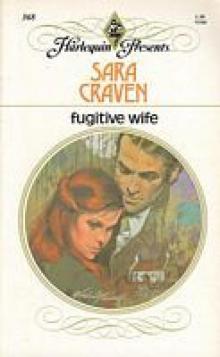 Fugitive Wife
Fugitive Wife Desperate Measures
Desperate Measures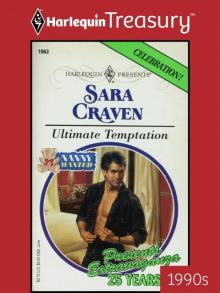 Ultimate Temptation (Harlequin Presents)
Ultimate Temptation (Harlequin Presents)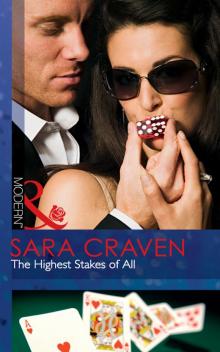 The Highest Stakes of All
The Highest Stakes of All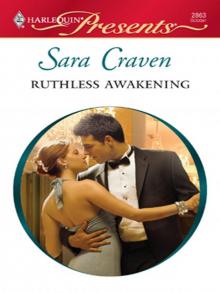 Ruthless Awakening
Ruthless Awakening Rome's Revenge
Rome's Revenge Forced Bride
Forced Bride Summer of the Raven
Summer of the Raven Smokescreen Marriage
Smokescreen Marriage The Innocent's Shameful Secret
The Innocent's Shameful Secret Marriage by Deception
Marriage by Deception The Virgin s Wedding Night
The Virgin s Wedding Night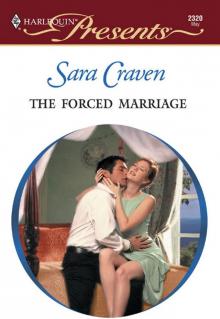 The Forced Marriage (Italian Husbands)
The Forced Marriage (Italian Husbands) The Innocent's Sinful Craving
The Innocent's Sinful Craving Inherited by Her Enemy
Inherited by Her Enemy Wife in the Shadows
Wife in the Shadows The Innocent's Surrender
The Innocent's Surrender Storm Force
Storm Force The Seduction Game (Harlequin Presents)
The Seduction Game (Harlequin Presents) The Santangeli Marriage
The Santangeli Marriage In the Millionaire's Possession
In the Millionaire's Possession The Forced Marriage
The Forced Marriage Alien Vengeance
Alien Vengeance A Nanny for Christmas
A Nanny for Christmas His Reluctant Bride
His Reluctant Bride Heart of a Hero
Heart of a Hero The Price of Retribution
The Price of Retribution Irresistible Temptation
Irresistible Temptation Dark Apollo
Dark Apollo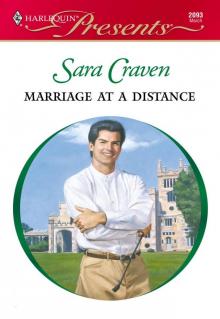 Marriage at a Distance (Presents, 2093)
Marriage at a Distance (Presents, 2093) Count Valieri's Prisoner
Count Valieri's Prisoner The Innocent's One-Night Confession
The Innocent's One-Night Confession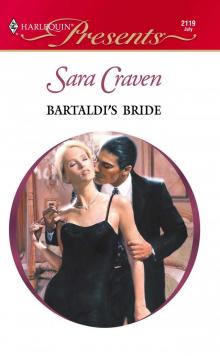 Bartaldi's Bride
Bartaldi's Bride His Untamed Innocent
His Untamed Innocent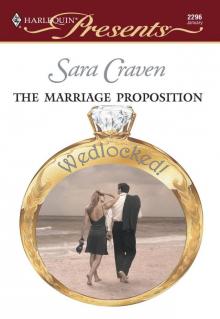 The Marriage Proposition
The Marriage Proposition The Right Bride?
The Right Bride? The End of her Innocence
The End of her Innocence